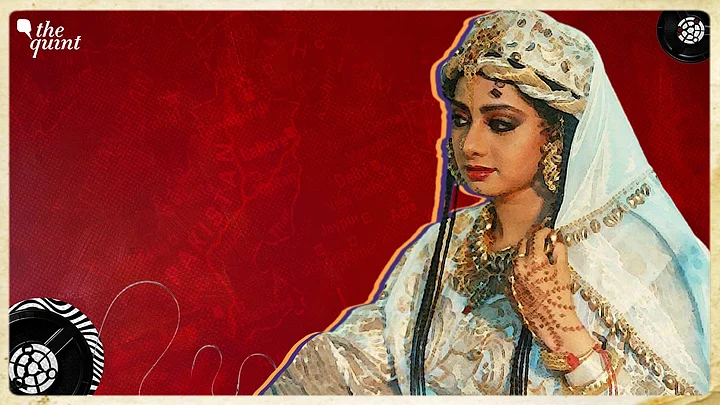"In the spring, a young man's fancy lightly turns to thoughts of love”; and as Phalgun days inch towards Holi, Sridevi is all Hindi cinema disciples like us can think of. For in 2018, just a week before Holi, the mood around us turned somber as news of Sridevi’s death made its way to our homes. As a sign of respect to the beloved actor, many a household—filmy and non-filmy alike canceled their Holi celebrations.
And so it is the time of the year this week when Sridevi devotees go down the rabbit hole of her associations—scouring social media and search engines for clips from her films, the song compilations, and interviews with the diva.
If the linguistic roots of the term muhajir —the uprooted, linger in the Urdu poet’s reference to a night of hijr e firaq (the lover’s absence and a night of lament for the beloved), then we are all in a state of permanent exile from our beloved Sridevi.
She had left millions of us bereft of the week of Faiz Ahmed Faiz’s birth anniversary and so it is apt that we channel his dil-e-man musafir-e-man (the heart the wayfarer) as we pursue the elegies to her.
hameñ din se raat karnā
kabhī is se baat karnā
kabhī us se baat karnā
tumheñ kyā kahūñ ki kyā hai
shab-e-ġham burī balā hai
Pakistan's Political Shift & Sridevi's Rising Cross-Border Popularity
Everyone has their Sridevi story and I thought mine was a very Pakistani one (and considering 'tis the season of Pathaan)—a Pashtun love story for what she meant for my generation. The Sridevi years for us were marked by the decade of recovering from the ravages General Zia ul Haq had unfurled upon the Pakistani landscape and the serendipity that was Sridevi’s magnum opus Chandni (1989) overlapping with the arrival of Benazir Bhutto in our political scene.
There was hope and Sridevi’s oeuvre marked an intense energy and enthusiasm for the future . Sridevi was the protagonist, Chandni was Benazir Bhutto—there was someone who was our hero(ine) , she was charming and unique and ready to challenge all that was staid and oppressive. And when Sridevi plays a Pashtun Benazir in Khuda Gawah (1992), my two worlds met in what was our taste of the metaverse.
Yes, the years that were to follow would be complicated, and one day we will tumble down from that high—but what never leaves us is how we felt in that moment, to be optimistic after years of dismay.
Sridevi's (and Benazir’s) language of love was this effervescent giddiness of a daydream and it is this state of mind that we want to revisit decades later when we watch the duo's progeny on the global stage. The lodestar of my lifeworld will always remain in 1989 and as I wrote in my tribute to Sridevi five years ago on her death: "in the flutter of a yellow chiffon sari that dances still in the wind and Benazir Bhutto’s hand tugging at her head scarf which is escaping her hairpins, are their indomitable spirits that refuse to keep still."
How India's Raging Star Amassed a Global Appeal
This week as the world watched the documentary series The Romantics on the OTT platform Netflix, a new generation is captivated by the alluring siren that was our Sridevi. As she dances on to the screen, there must have been many a collective sigh amongst family and friend circles that had been witness to her magic.
After all, even now the opening strains to Tere Mere Honto Pe, and Mere Haatho Mai Nau Nau Choorhiya (Chandni, 1989) and Kabhi Mai Kahoon (Lamhe, 1991) have the power to usher in our young hopeful selves, and to lift the dark clouds of our 2023 grief.
The other day The Guardian carried a feature on people who have started stockpiling discontinued consumer products. They do this, they explain, as it takes them back to the 1980s. As one interviewee explained it is like “time travelling”. A whiff of a particular perfume spray or taste of a chocolate bar "takes me straight back to the 1980s, getting ready to go out, and all that excitement of going out as a teenager, wondering if I was going to meet that special someone, and feeling quite excited about life.”
Perhaps, that explains the magic of Sridevi and our insatiable love affair with her—she makes us feel excited about our lives again. This is why her goofy Hawa Hawai is still the stuff of a delightful school performance even now.
One click of the heels and we are the unstoppable Seema from Mr India (1987), a twirl under an umbrella and we are the effervescent Manju from ChaalBaaz (1989).
In the film Chandni, she plays a protagonist who swoons and is dreamily transported to Switzerland; and so every year in quite the Gulzaresque "band aankho se roz main sarhad paar chala jaata hoon", we close our eyes and allow the music to carry us to a time when she was around us still.
We will never forget you, our first love Phoolon ke is shehar ki mulakat yaad rahegi….ankhiyo me.n tu bas jaa ankhiya me.n bund kar lu. So spellbound by our enchantress still, we dream a little and find ourselves deserving of love and hope again.
(Aneela Babar is the author of We are all Revolutionaries Here: Militarism, Political Islam and Gender in Pakistan ( 2017) and a forthcoming memoir on consuming Hindi cinema in Rawalpindi. This is an opinion article and the views expressed are the author's own. The Quint neither endorses nor is responsible for them.)
